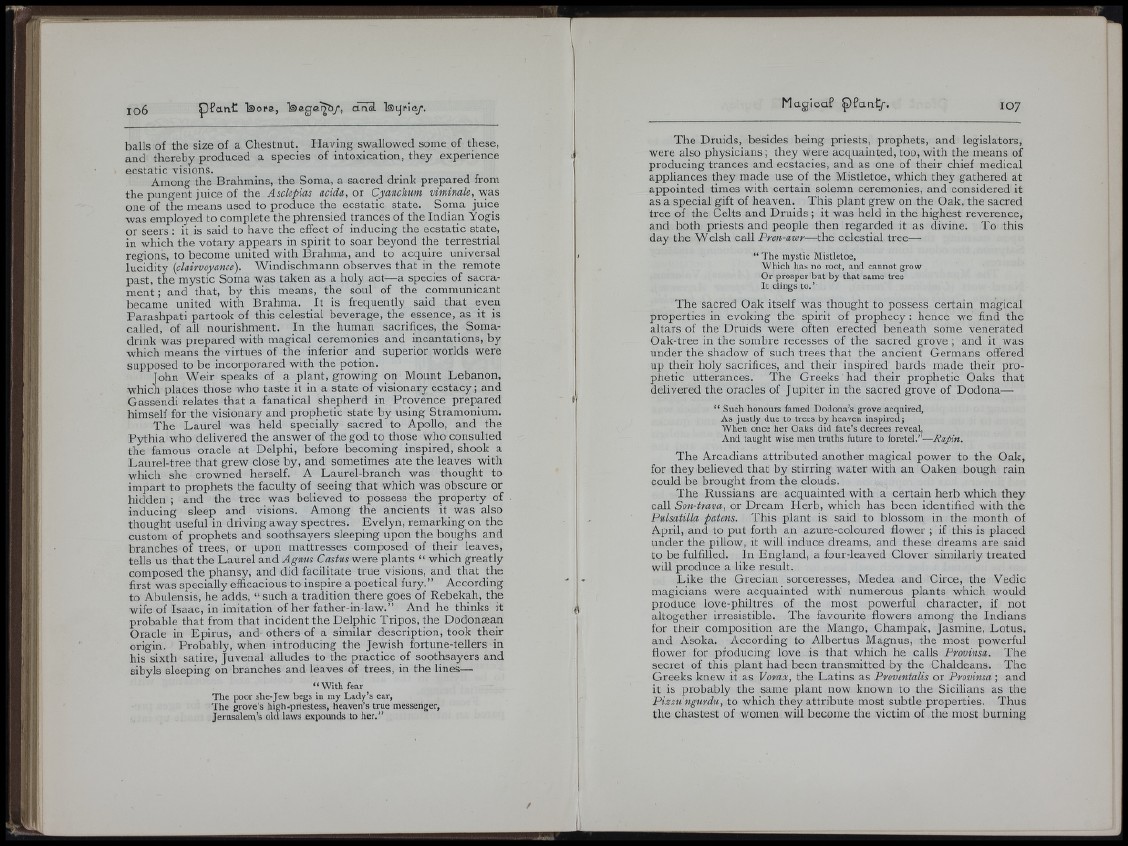
10 6 p F a n t b o i'e , Tsegeqa/, cmel bcjric/. MagieaF pFanl^, 107
fi 'i'
:!ii
i"
J
I ^
I* J
4|'!
balls of the size of a Chestnut. Having swallowed some of these,
and thereby produced a species of intoxication, they experience
ecstatic visions.
Among the Brahmins, the Soma, a sacred drink prepared from
the pungent juice of the Asclepias acida, or Cyanchum viminale, was
one of the means used to produce the ecstatic state. Soma juice
was employed to complete the phrensied trances of the Indian Yogis
or seers: it is said to have the effect of inducing the ecstatic state,
in which the votary appears in spirit to soar beyond the terrestria..
regions, to become united with Brahma, and to acquire universal
lucidity {clairvoyance). Windischmann observes that in the remote
past, the mystic Soma was taken as a holy act—a species of sacrament
; and that, by this means, the soul of the communicant
became united with Brahma. It is frequently said that even
Parashpati partook of this celestial beverage, the essence, as it is
called, of all nourishment. In the human sacrifices, the Soma-
drmk was prepared with magical ceremonies and incantations, by
which means the virtues of the inferior and superior worlds were
supposed to be incorporared with the potion.
John Weir speaks of a plant, growing on Mount Lebanon,
which places those who taste it in a state of visionary ecstacy; and
Gassendi relates that a fanatical shepherd in Provence prepared
himself for the visionary and prophetic state by using Stramonium.
The Laurel was held specially sacred to Apollo, and the
Pythia who delivered the answer of the god to those who consulted
the famous oracle at Delphi, before becoming inspired, shook a
Laurel-tree that grew close by, and sometimes ate the leaves with
which she crowned herself. A Laurel-branch was thought to
impart to prophets the faculty of seeing that which was obscure or
hidden ; and the tree was believed to possess the property of
inducing sleep and visions. Among the ancients it was also
thought useful in driving away spectres. Evelyn, remarking on the
custom of prophets and soothsayers sleeping upon the boughs and
branches of trees, or upon mattresses composed of their leaves,
tells us that the Laurel and Agnus Castus were plants “ which greatly
composed the phansy, and did facilitate true visions, and that the
first was specially efficacious to inspire a poetical fury.” According
to Abulensis, he adds, “ such a tradition there goes of Rebekah, the
wife of Isaac, in imitation of her father-in-law.” And he thinks it
probable that from that incident the Delphic Tripos, the Dodonsean
Oracle in Epirus, and others of a similar description, took their
origin. Probably, when introducing the Jewish fortune-tellers in
his sixth satire, Juvenal alludes to the practice of soothsayers and
sibyls sleeping on branches and leaves of trees, in the lines—
“ With fear
The poor she-Jew begs in my Lady’s ear,
The grove’s high-priestess, heaven’s true messenger,
Jerusalem’s old laws expounds to her.”
ii
The Druids, besides being priests, prophets, and legislators,
were also physicians; they were acquainted, too, with the means of
producing trances and ecstacies, and as one of their chief medical
appliances they made use of the Mistletoe, which they gathered at
appointed times with certain solemn ceremonies, and considered it
as a special gift of heaven. This plant grew on the Oak, the sacred
tree of the Celts and Druids; it was held in the highest reverence,
and both priests and people then regarded it as divine. To this
day the Welsh call Pren-awr—the celestial tree—
“ The mystic Mistletoe,
Which has no root, and cannot grow
Or prosper but by that same tree
It clings to.’ ’
The sacred Oak itself was thought to possess certain magical
properties in evoking the spirit of prophecy: hence we find the
altars of the Druids were often erected beneath some venerated
Oak-tree in the sombre recesses of the sacred grove ; and it was
under the shadow of such trees that the ancient Germans offered
up their holy sacrifices, and their inspired bards made their prophetic
utterances. The Greeks had their prophetic Oaks that
delivered the oracles of Jupiter in the sacred grove of Dodona—
“ Such honours famed Dodona’s grove acquired.
As justly due to trees by heaven inspired;
When once her Oaks did fate’s decrees reveal,
And taught wise men truths future to foretel.”—Rapin.
The Arcadians attributed another magical power to the Oak,
for they believed that by stirring water with an Oaken bough rain
could be brought from the clouds.
The Russians are acquainted with a certain herb which they
call Son-trava, or Dream Plerb, which has been identified with the
Pulsatilla patens. This plant is said to blossom in the month of
April, and to put forth an azure-coloured flower ; if this is placed
under the pillow, it will induce dreams, and these dreams are said
to be fulfilled. In England, a four-leaved Clover similarly treated
will produce a like result.
Like the Grecian sorceresses, Medea and Circe, the Vedic
magicians were acquainted with numerous plants which woulc.
produce love-philtres of the most powerful character, if not
altogether irresistible. The favourite flowers among the Indians
for tlieir composition are the Mango, Champak, Jasmine, Lotus,
and Asoka. According to Albertus Magnus, the most powerful
flower for producing love is that which he calls Provinsa. The
secret of this plant had been transmitted by the Chaldeairs. The
Greeks knew it as Vorax, the Latins as Proventalis or Provinsa ; and
it is probably the same plant now known to the Sicilians as the
Pizzu'ngurdu, to which they attribute most subtle properties. Thus
the chastest of women will become the victim of the most burning